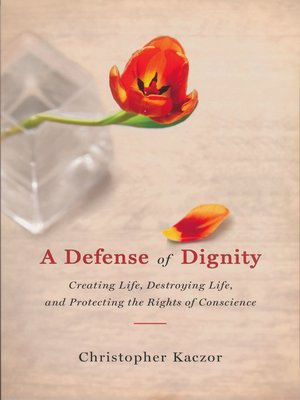Defense of Dignity
ebook ∣ Creating Life, Destroying Life, and Protecting the Rights of Conscience · Notre Dame Studies in Medical Ethics and Bioethics
By Christopher Kaczor

Sign up to save your library
With an OverDrive account, you can save your favorite libraries for at-a-glance information about availability. Find out more about OverDrive accounts.
Find this title in Libby, the library reading app by OverDrive.



Search for a digital library with this title
Title found at these libraries:
| Library Name | Distance |
|---|---|
| Loading... |
Questions about the dignity of the human person give rise to many of the most central and hotly disputed topics in bioethics. In A Defense of Dignity: Creating Life, Destroying Life, and Protecting the Rights of Conscience, Christopher Kaczor investigates whether each human being has intrinsic dignity and whether the very concept of "dignity" has a useful place in contemporary ethical debates. Kaczor explores a broad range of issues addressed in contemporary bioethics, including whether there is a duty of "procreative beneficence," the ethics of ectopic pregnancy, and the possibility of "rescuing" human embryos with human wombs or artificial wombs. A Defense of Dignity also treats issues relevant to the end of life, including physician-assisted suicide, provision of food and water to patients in a persistent vegetative state, and how to proceed with organ donation following death. Finally, what are the duties and prerogatives of health care professionals who refuse in conscience to take part in activities that they regard as degrading to human dignity? Should they be forced to do what they consider to be violations of the patient's well being, or does patient autonomy always trump the conscience of a health care professional?
Grounded in the Catholic intellectual and moral tradition, A Defense of Dignity argues that all human beings from the beginning to the end of their lives should be treated with respect and considers how this belief should be applied in controversial cases.







